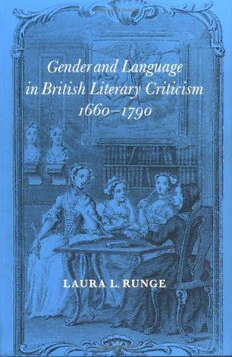
Gender and Language in British Literary Criticism, 1660-1790 PDF
243 Pages·1997·6.662 MB·
Most books are stored in the elastic cloud where traffic is expensive. For this reason, we have a limit on daily download.
Preview Gender and Language in British Literary Criticism, 1660-1790
Description:
During the eighteenth century British critics believed that masculine values represented the best literature while feminine terms signified less important works or authors. Laura Runge argues that an understanding of the language of eighteenth-century criticism requires careful analysis of the gendered language of the era. Her exploration of why, for example, the heroic and the sublime were seen as masculine modes while the novel was viewed as a feminine genre addresses issues central to eighteenth-century studies that are still relevant today.
See more
The list of books you might like
Most books are stored in the elastic cloud where traffic is expensive. For this reason, we have a limit on daily download.
